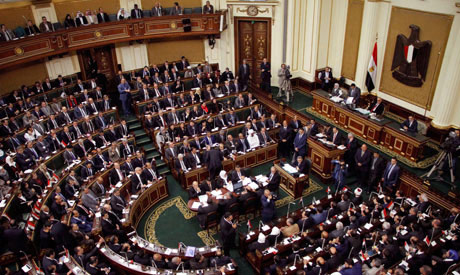
File Photo: A general view of the Egyptian parliament during a working session (AP)
Egypt's House of Representatives approved on Monday a host of laws on economic and social topics. The session was the last before the MPs' summer recess.
With House elections slated for November, Parliament Speaker Ali Abdel-Aal gave MPs the choice to reconvene following the recess and before the five-year term ends.
The majority of MPs said they do not wish to come back for other meetings.
Abdel-Aal said “the law allows we hold other meetings but it is better to adjourn today because if we decide to hold another meeting the government may be tempted to refer three or four new laws to us to discuss,” said Abdel-Aal.
He also decided not to open a debate on a law regulating Egypt’s Dar Al-Iftaa, or the House of Fatwas (religious edicts).
The law, drafted by parliament’s religious affairs committee, was harshly attacked by Ahmed El-Tayeb, the grand imam of Al-Azhar. El-Tayeb said the law violates Article 7 of the constitution, which gives Al-Azhar absolute supervision of religious affairs, including the issuing of religious fatwas.
Abdel-Aal insisted that parliament will not adjourn before it discusses and approves a new government-drafted law on unified tax procedures.
“This is a very important law that we all should discuss and pass before we adjourn after five years of meetings,” said Abdel-Aal.
The 90-article law on was already approved by MPs a week earlier.
Finance minister Mohamed Maait said the law aims to facilitate the collection of taxes and boost the country’s financial revenues to push economic development forward.
“All taxation procedures will be automated via electronic systems and this will save a lot of time, effort and cost,” said Maait, adding that “this is the first time in Egypt’s history that it has a unified tax procedures law.
“Each tax payer will have a certain figure which will be used to tackle his tax dealings,” said Maait, adding that “the automation of tax procedures in Egypt will be completed in December.”
Mohamed Abul-Enein, an independent MP and a businessman, said the law will also help settle tax disputes and enable the government to collect more than EGP 4 billion in tax arrears.
A report by parliament’s budget committee said the new law facilitates the collection of taxes by forging four laws into one.
“These are the income tax law (91/2005), the value added tax law (67/2016), the state's financial resources development tax law (147/1984) and the stamp tax law (111/1980),” said the report.
Meanwhile, parliament finally approved 12 laws tackling a variety of economic and social topics. The list includes laws on regulating healthcare for patients suffering from psychological troubles; expropriating private property for public use; regulating the activities of microfinance projects; amending the construction law (119/2008); modifying the commercial register law (34/1970); and the law on regulating medical clinical research.
Other laws approved included regulating the Egyptian Waqf (religious endowments) Authority; establishing the Fund for Supporting Physically Challenged Persons; regulating waste management; amending the electricity law (87/2015), and the law on establishing the Catholic and Anglican Church Waqf Authority.
The list includes a law on licensing the two ministers of petroleum and housing to contract the Egyptian Mining Company for utilising salt lakes and quarries, in addition to the customs law..
Short link: